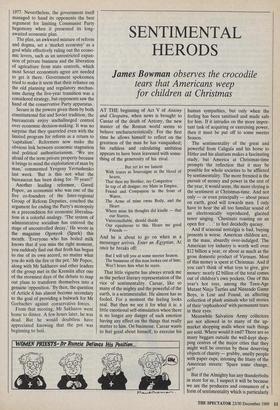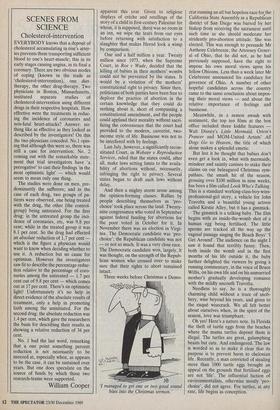SENTIMENTAL HERODS
James Bowman observes the crocodile
tears that Americans weep for children at Christmas
AT THE beginning of Act V of Antony and Cleopatra, when news is brought to Caesar of the death of Antony, the new master of the Roman world seems to behave uncharacteristically. For the first time he allows himself to reflect on the greatness of the man he has vanquished; his ruthless and calculating ambition appears to have been leavened with some- thing of the generosity of his rival.
. . . But yet let me lament
With teares as Soueraigne as the blood of hearts, That thou my Brother, my Competitor In top of all designe; my Mate in Empire, Friend and Companion in the front of Wane, The Arme of mine owne Body, and the Heart Where mine his thoughts did kindle — that our Starres, Vnreconciliable, should diuide Our equalnesse to this. Heare me good Friends —
And he is about to go on when as a messenger arrives. Enter an iEgyptian. At once he breaks off:
But I will tell you at some meeter Season. The businesse of this man lookes out of him; Wee'l heare him what he sayes.
That little vignette has always struck me as the perfect literary representation of the vice of sentimentality. Caesar, like so many of the mighty and the powerful of the earth, is a sentimentalist. He almost has us fooled. For a moment the feeling looks real. But then we see it for what it is: a little emotional self-stimulation when there is no longer any danger of such emotion having any effect on the things that really matter to him. On businesse. Caesar wants to feel good about himself, to exercise his human sympathies, but only when the feeling has been sanitised and made safe for him. If it intrudes on the more impor- tant task of acquiring or exercising power, then it must be put off to some meeter Season.
The sentimentality of the great and powerful from Caligula and his horse to Hitler and his alsatians makes a fascinating study, but America at Christmas-time prompts the reflection that it may be possible for whole societies to be afflicted by sentimentality. The more frenzied is the pursuit of money and power in the rest of the year, it would seem, the more cloying is the sentiment at Christmas-time. And not only — or even principally — about peace on earth, good will towards men. I only have to hear the all too familiar sound of an electronically reproduced, glaceed tenor singing. 'Chestnuts roasting on an open fire . . .' to feel decidedly queasy.
And if seasonal nostalgia is bad, buying presents is worse. American children are, in the mass, absurdly over-indulged. The American toy industry is worth well over $12 billion a year, or about as much as the gross domestic product of Vietnam. Most of this money is spent at Christmas. And if you can't think of what toys to give, give money: nearly £2 billion of the total comes out of children's own pockets. One of this year's hot toys, among the Teen-Age Mutant Ninja Turtles and Nintendo Game Boys, is Lost and Found, an affecting collection of plush animals who tell stories of their 'orphanhood' with permanent tears in their eyes.
Meanwhile Salvation Army collectors are not allowed in to many of the up- market shopping malls where such things are sold. Where would it end? There are so many beggars outside the well-kept shop- ping centres of the major cities that they might well be overrun by these deserving objects of charity — grubby, smelly people with paper cups, intoning the litany of the American streets: 'Spare some change, sir?'
But if the Almighty has any thunderbolts in store for us, I suspect it will be because we are the producers and consumers of a form of sentimentality which is particularly apparent this year. Given to religiose displays of crèche and retellings of the story of a child in first-century Palestine for whom, it is supposed, there was no room in an inn, we wipe the tears from our eyes before returning with satisfaction to a slaughter that makes Herod look a wimp by comparison.
One and a half million a year. Twenty million since 1973, when the Supreme Court, in Roe v Wade, decided that the killing of babies in their mothers' wombs could not be prevented by the states. It would be a violation of the mothers' constitutional right to privacy. Since then, politicians of both parties have been free to deplore the practice of abortion in the certain knowledge that they could do nothing about it, short of compassing a constitutional amendment, and the people could applaud their morality without sacri- ficing the convenience that the court had provided to the modern, careerist, two- income style of life. Businesse was not to be interfered with by feelings.
Last July, however, a significantly recon- stituted Court, in Webster v Reproductive Services, ruled that the states could, after all, make laws setting limits to the availa- bility of abortions without, necessarily, infringing the right to privacy. Several states began to draft such laws without delay.
And then a mighty storm arose among the opinion-forming classes. Rallies by people describing themselves as 'pro- choice' took place across the land. Twenty- nine congressmen who voted in September against federal funding for abortions for the poor voted in October for it. In November there was an election in Virgi- nia. The Democratic candidate was 'pro- choice' ; the Republican candidate was not — or not so much. It was a very close race. The Democratic candidate won, largely, it was thought, on the strength of the Repub- lican women who crossed over to make sure that their rights to abort remained intact.
Three weeks before Christmas a Demo- `I managed to get one or two good sound bites into the Christmas sermon.' crat running an all but hopeless race for the California State Assembly in a Republican district of San Diego was barred by her bishop from receiving the sacrament until such time as she should moderate her stridently pro-abortion attitude. She was elected. This was enough to persuade Mr Anthony Celebrezze, the Attorney Gener- al of Ohio, that he did not, as he had previously supposed, have the right to impose his own moral views upon his fellow Ohioans. Less than a week later Mr Celebrezze announced his candidacy for governor of Ohio. A number of other hopeful candidates across the country came to the same conclusion about impos- ing their moral views — and about the relative importance of feelings and businesse.
Meanwhile, in a season awash with sentiment, the top ten films at the box office included three kiddie features Walt Disney's Little Mermaid, Orion's Prancer and MGM-United Artists' All Dogs Go to Heaven, the title of which alone makes a splendid emetic.
But lest it be thought that babies don't even get a look in, what with mermaids, reindeer and saintly canines to stake their claims on our beleagured Christmas sym- pathies, the smash hit of the season, grossing over $100 million in nine weeks, has been a film called Look Who's Talking. This is a standard working-class-boy-wins- professional-girl story, a vehicle for John Travolta and a beautiful young actress called Kirstie Alley, but it has a gimmick. The gimmick is a talking baby. The film begins with an inside-the-womb shot of a human egg being fertilised. The little sperms are tracked all the way up the vaginal passage singing the Beach Boys' I Get Around'. The audience on the night I saw it found that terribly funny. Then, both inside the womb and in the first months of his life outside it, the baby further delighted the viewers by giving a running commentary, in the voice of Bruce Willis, on his own life and on his unmarried mother's gradually developing romance with the mildly uncouth Travolta.
Needless to say, he is a thoroughly charming child without a trace of snob- bery, wise beyond his years, and given to the risque wisecrack. We all felt better about ourselves when, in the spirit of the season, love was triumphant.
Oh yes! Here's a nature note. In Florida the theft of turtle eggs from the beaches where the mama turtles deposit them is illegal. The turtles are great, galumphing beasts but cute. And endangered. The law is worded so as to make it clear that its purpose is to prevent harm to chelonian life. Recently, a man convicted of stealing more than 1000 turtle eggs brought an appeal on the grounds that fertilised eggs are not 'life'. The influential faction of environmentalists, otherwise mostly 'pro- choice', did not agree. For turtles, at any rate, life begins as conception.











































































































 Previous page
Previous page